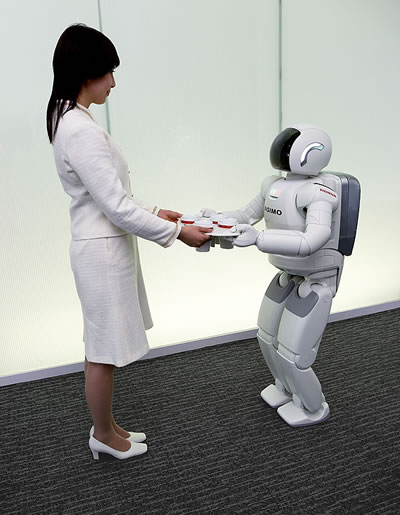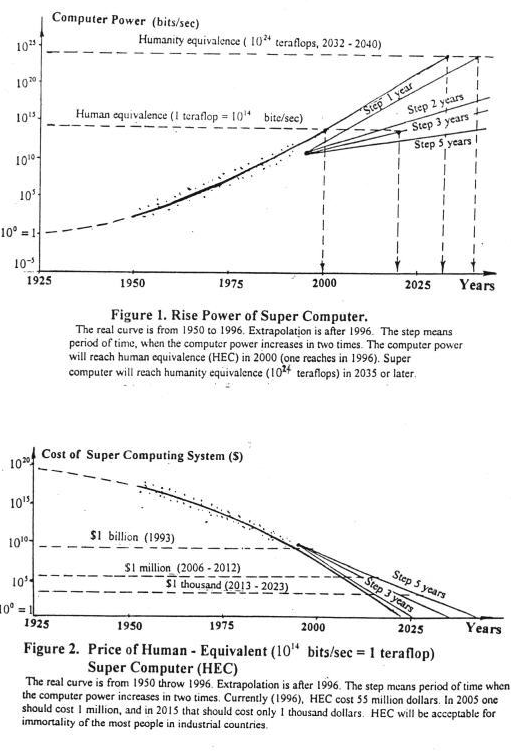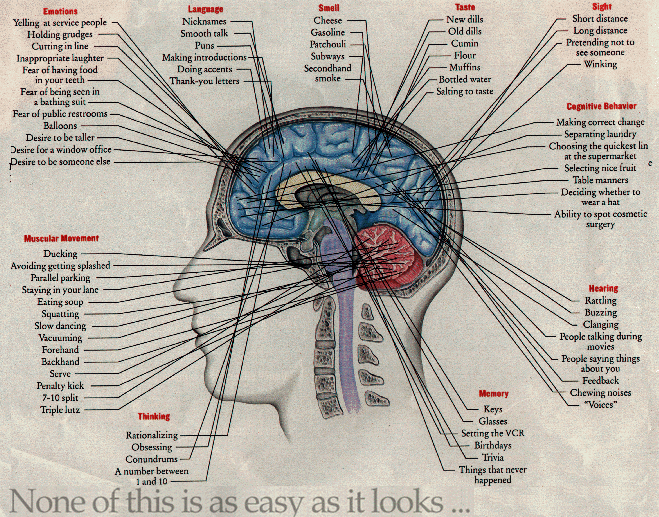First we create the tools, then the wheels, engine, and now everyone uses and relies ona computer (whether desktop, laptop, smartphone or tablet). What do you think willcome next? Will we continue to develop computers for the next several hundred years,or will something else better to go that make our lives easier?
we are already on the computer last. we have moved to an electronic world where, almost every item of mechanical equipment and by default have a computer in it.
The next generation of mechanical aids to telepathically connected to human cognition.Typing and talking too slow for the things we want to accomplish today. Also the devicedoes not, not even a pair of sunglasses on Daniel Suarez's Daemon and Freedom will be enough for Augmented Reality, we need a computer directly to the braintransmission in both directions.
We've been the last computer. We've moved to an electronic world where, almost everyitem of mechanical equipment and by default have a computer in it. The next generationof mechanical aids to telepathically connected to human cognition. Typing and talkingtoo slow for the things we want to accomplish today. Also the device does not, not evena pair of sunglasses on Daniel Suarez's Daemon and Freedom will be enough forAugmented Reality, we need a computer directly to the brain transmission in bothdirections. by "w3ace"
The next generation of mechanical aids to telepathically connected to human cognition.Typing and talking too slow for the things we want to accomplish today. Also the devicedoes not, not even a pair of sunglasses on Daniel Suarez's Daemon and Freedom will be enough for Augmented Reality, we need a computer directly to the braintransmission in both directions.
We've been the last computer. We've moved to an electronic world where, almost everyitem of mechanical equipment and by default have a computer in it. The next generationof mechanical aids to telepathically connected to human cognition. Typing and talkingtoo slow for the things we want to accomplish today. Also the device does not, not evena pair of sunglasses on Daniel Suarez's Daemon and Freedom will be enough forAugmented Reality, we need a computer directly to the brain transmission in bothdirections. by "w3ace"
I think Terence McKenna answer this better than anyone so far ...
Here are a few paragraphs from one of his lectures is found here - http://goo.gl/nW3B You can also find audio lectures by searching for "Eros and the Eschaton" http://deoxy.org/media/McKenna/Eros_and_Eschaton
"And what I have observed - and I think it is fair to give credit to the psychedelic experience to this - what I have observed the nature of which builds upon the previously established level of complexity This is a great general law of nature that you own. Senses will confirm to you, but never allowed into the canon of science What I mean by that is built based on the complexity of nature is as follows:. As the universe was born, in a state of dubious and controversial so-called Big Bang, it was initially just pure electron plasma. which The simplest that might be. There is no atoms, no molecules, no system is highly organized in any form exists. just pure plasma energy expansion. And as the universe cooled, the cooled enough, a new kind of phenomenon we say appears -.. , out of the situation As the universe cools, nuclei can be formed, and electrons can stay in orbit stable As the universe cooled further, the chemical bonds into the possibility of still later. hydrogen bonding, which is a weak bond, which is the basis of biology. So the age of the universe, it complexified. It is so obvious that it was never really challenged, but on the other side was never hugged as a general principle and reliable, either. Follow through with me. From the atomic system comes chemical systems. From the chemical system come covalent hydrogen bonds, carbon bond, which is a chemical compound or an organic prebiotic. Of the chemicals that come macrophysical system which we call the membrane, gel, complex transfer fee, something like this. This system is a prerequisite for life chemistry. Simple life, the life of prokaryotes, life naked DNA unnucleated marked primitive life on this planet. Of the life that comes eukaryotes, nucleated cells, and then colony cell complex. And then the specialization of cells, resulting in higher animals, leading to a social animal; toward the complex social system, which leads to technology, led to world-girdling culture of electronic-based information transfer-oriented as we are. (Someone said, "What's so progressive about the media is spreading darkness at the speed of light?". And the applause it can ... can.) Well, so This is very interesting: that it turns out, the way the universe works is the platform of the previous complexity is achieved - chemical, electrical, social, biological, anything. a new form of complexity can be built that cross ontological boundaries. In other words, what I mean with it is that biology is based on complex chemistry, but it's more complex than chemical. social system based on the organization of the living animal, and yet more than animal life. So this is a general law of the universe, ignored by science - that comes out of complexity comes greater complexity. We almost can say that the universe, nature, is a novelty-conserving engine or complexity-conserving. This makes the complexity, and sustain it. And use it as a basis for further complexity. "
Based on the train of thought, it is easy to see that we / humans (as the leading edge of biological / social evolution) will give birth to the next level of complexity (computer / network) that will give way to something more complex. I believe Twitter-like system is a crude precursor to the next level of interconnection / complexity.
by: "steepdecline"
Neural interfacing. The brain is the largest computer, and medical research has shown that by stimulating certain areas of the brain, patients will actually experience any of the sensory experience they will go through the normal senses.
Because the brain is the control center and shops as well as interpretation for all the sensory input through the senses, each and every feeling that we have in all the variations are many and experience, is the result of the brain.
Take for example odor, olfactory cells are the nerve cells involved with the sense of smell, and is located in the patch in nasal tissue that connect directly to the brain. When smell cells stimulate the olfactory nerve messages sent to a specific area of the brain, the brain is stimulated and interoperates stimuli / messages as a specific odor with any degree abundant. During brain surgery on some patients later reported that they have a sense of smell of burnt toast and more. It is also common in some epilepsy and other brain seizures. Deep brain stimulation is the field of medical study that is promising in improving or repairing a brain function and disease problems.
In the future neural interface devices will be able to fix or help people with problems of brain function to normal or at least lead a better life.
Extension is that it can also lead to the discovery of how to actively enable the brain to interface with external devices and processes that will eventually replace the way computers and computational processes. Imagine a game where you actually have an immersion into the reality of the game and what happens in the game that happens in your brain and therefore the nervous system and senses.
Imagine this medical application.
Business and cognitive abilities and so on. source (s):
http://www.sciencedirect.com/science?_ob=ArticleURL&_udi=B6WFG-4Y34V5C- ...
http://www.mrc.ac.uk/Achievementsimpact/Storiesofimpact/Deepbrainstimulatio ...
http://www.physorg.com/news77992285.html
by: "island_druid"
In 2003, roboticist Rodney Brooks to give speech (see video link) about how robots will soon attack our lives. He made the interesting analogy between how the computer was originally intended for video games before they became what we see today and the same trend we see with the robot. Robots are now being sold as toys, simple design kit, and now we see them to be used in simple household chores. Next, we'll see them in every aspect of our lives.
Similar to how a computer to initiate a workers' revolution in a lot of jobs eliminated since they can be done by computer, we will see even more jobs eliminated by the robot. Handyman job will be a thing of the past. Robots will paint, do carpentry, building something (did they build things now), and will even cook. Finally, all the manual labor requirements will be satisfied by the robot.
Not too long after that, personal robots will begin to be bought by the family. This is a scene imagined in Isaac Asimov's "The Positronic Man" (which Hollywood turned into "The Bicentennial Man" in 1999) and by Asimov's Robot novels in all this.
Because the brain is the control center and shops as well as interpretation for all the sensory input through the senses, each and every feeling that we have in all the variations are many and experience, is the result of the brain.
Take for example odor, olfactory cells are the nerve cells involved with the sense of smell, and is located in the patch in nasal tissue that connect directly to the brain. When smell cells stimulate the olfactory nerve messages sent to a specific area of the brain, the brain is stimulated and interoperates stimuli / messages as a specific odor with any degree abundant. During brain surgery on some patients later reported that they have a sense of smell of burnt toast and more. It is also common in some epilepsy and other brain seizures. Deep brain stimulation is the field of medical study that is promising in improving or repairing a brain function and disease problems.
In the future neural interface devices will be able to fix or help people with problems of brain function to normal or at least lead a better life.
Extension is that it can also lead to the discovery of how to actively enable the brain to interface with external devices and processes that will eventually replace the way computers and computational processes. Imagine a game where you actually have an immersion into the reality of the game and what happens in the game that happens in your brain and therefore the nervous system and senses.
Imagine this medical application.
Business and cognitive abilities and so on. source (s):
http://www.sciencedirect.com/science?_ob=ArticleURL&_udi=B6WFG-4Y34V5C- ...
http://www.mrc.ac.uk/Achievementsimpact/Storiesofimpact/Deepbrainstimulatio ...
http://www.physorg.com/news77992285.html
by: "island_druid"
In 2003, roboticist Rodney Brooks to give speech (see video link) about how robots will soon attack our lives. He made the interesting analogy between how the computer was originally intended for video games before they became what we see today and the same trend we see with the robot. Robots are now being sold as toys, simple design kit, and now we see them to be used in simple household chores. Next, we'll see them in every aspect of our lives.
Similar to how a computer to initiate a workers' revolution in a lot of jobs eliminated since they can be done by computer, we will see even more jobs eliminated by the robot. Handyman job will be a thing of the past. Robots will paint, do carpentry, building something (did they build things now), and will even cook. Finally, all the manual labor requirements will be satisfied by the robot.
Not too long after that, personal robots will begin to be bought by the family. This is a scene imagined in Isaac Asimov's "The Positronic Man" (which Hollywood turned into "The Bicentennial Man" in 1999) and by Asimov's Robot novels in all this.
 Personal robots will be an extension of the computer. It will be able to do all the things a computer can do, except the only input that will be required is a verbal communication.Robots will be able to perform physical tasks, mixed with medium electronic calculations, to do something. Finally, the robot will find ways to make fun of art, music, and games.
Personal robots will be an extension of the computer. It will be able to do all the things a computer can do, except the only input that will be required is a verbal communication.Robots will be able to perform physical tasks, mixed with medium electronic calculations, to do something. Finally, the robot will find ways to make fun of art, music, and games.People will initially be afraid of robots, even more than they fear computers. Several types of protocols, such as Asimov's Three Laws of Robotics will be constructed for each robot. Asimov's three laws are like:
1. The robot may not injure humans or, through inaction, allow humans to come into danger.
2. A robot must obey every command given to him by humans, unless the order would conflict with the First Law.
3. A robot must protect its own existence as long as such protection does not conflict with the First or Second Law.
Robots will eventually lead to economic crisis, because they will elminate so many jobs and professions. Humans, with even more free time, will not know what to do with themselves. A social crisis will result.
In the next few hundred years, unparalleled discovery and advances will be made by humans and robots working together. Robots will eventually begin to resemble humans.The relationship between humans and robots will form. Human population will eventually stop growing and can actually begin to shrink.
What happens after that will be up to science fiction writer ... source (s): http://www.ted.com/talks/rodney_brooks_on_robots.html
http://www.imdb.com/title/tt0182789/
by: "justin_time"
The most absurd and without a doubt that will come after the computer is Artificial Intelligence. With continuous research in the neck break speed there is no doubt this discovery will soon follow and only time will tell.
-Quote-
"" It seems plausible that with technology we can, within fairly close, "said scifi legend Vernor Vinge," make (or become) creatures who surpass humans in every intellectual and creative dimension. The incident outside such events - like the singularity - are as unimaginable to us as opera is a flatworm. "
"The Singularity" is seen by some as the end point of our culture today, when ever-accelerating evolution of technology we finally catch up and change everything. Has been described as everything from the end of life all to the beginning of a utopian age, which may recognize as the endgames most other religious beliefs. "
-End quote-
source (s): http://www.dailygalaxy.com/my_weblog/2009/09/a-singular-something-in-sixty- ...
by: "http://www.dailygalaxy.com/my_weblog/2009/09/a-singular-something-in-sixty-.
by: "edwardclint"
The answer given so far largely been for faster, smarter computers smaller. AI, Neural Interfacing, Robotics even just an extension of sophisticated computers. In my opinion, the computer was an invention like the wheel base. I think that we tend to be stuck on the computer for at least another hundred years, and because it is difficult to see what's next?
Why? Because whatever we think of as the next is all computer based. Ray Kurzweil says better than me, but basically the logical end to computing is having your body impregnated with millions of tiny computing engines that all talk to each interface, the other with the body and even talk to another machine in the body. We have a long way, a very long way, to go with the computer. One hundred years at least, if not two hundred.
Very cool, but your question is what comes next. What happens when a billion gigahertz computer with a thousand exabytes of memory comes embedded in your brain at birth, and we all think it's just about as boring as it rounded a roll on the ground?
I think what happened next is the mastery of space / time. With a fantastic, incredible computer assisted human intelligence (which like it or not, and will inevitably kill Artificial Intelligence), we will be able to cope with the subjects of previous generations never could find out. Wormholes, Time travel, FTL, even Re-arrange the stars and solar systems to suit our fancy - if that is possible we will know how to do it.
Whatever comes next, you can bet that it will be powered by a computer. Even more-so than the wheel, I think the computer (not a computer today but the computer from a hundred years from now) is perhaps our most important discoveries. But I think cavemen thought that the wheel well. source (s): http://en.wikipedia.org/wiki/Raymond_Kurzweilmages:




by: "dholowiski"
http://www.mahalo.com/answers/what-will-come-after-computers

0 comments:
Post a Comment